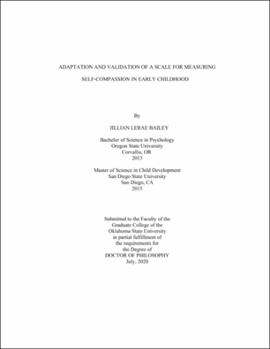| dc.description.abstract | The overarching goal of this research was to adapt and validate a scale for measuring self-compassion in early childhood. The initial 23-item scale was adapted from Neff's (2003a) original self-compassion scale and asked parents about concrete behaviors and coping methods of their child. Items assessed children's early expressions of self-kindness, common humanity, mindfulness, self-judgment, isolation, and over-identification. Confirmatory factor analysis was used during pilot testing with parents (N=70), where good fit was demonstrated for a 2-factor model involving one positive and one negative factor of early self-compassion. The factors were tested again with a second sample of parents (N=185) and revealed adequate fit indices for this 2-factor structure on both factor 1 (X²=2.27, p=.81, RMSEA=.000, RMSEA upper bound=.06, CFI=1.00, TLI=1.05, SRMR=.018) and factor 2 (X²=8.78, p=.119, RMSEA=.066, RMSEA upper bound=.137, CFI=.983, TLI=.967, SRMR=.026). Construct, convergent, and concurrent validity were determined for the Self-Compassion Scale for Early Childhood (SCS-EC). Specifically, results revealed significant associations between early self-compassion and other characteristics such as early emotion regulation, self-esteem, emotional well-being, temperament, and internalizing behaviors. Furthermore, internal consistency reliability was acceptable for both positive (a=.726) and negative factors (a=.756). Findings also revealed preliminarily evidence of a hypothesized socialization process due to congruence between parent and child emotion-related characteristics involving self-compassion and emotion regulation. This research should be considered as introductory and holds implications that pertain to positive parenting as well as both clinical and academic settings. Future research will continue to focus on the underpinnings of early emerging self-compassion and the socialization process. | |
